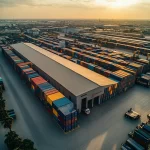Listen to the audio version of the blog here:
Ever wondered how India’s logistics sector would transform if the country established its own national shipping line?
That transformation may soon become a reality. The Bharat Container Shipping Line (BCL), a national container shipping carrier initiated by the Indian government, is set to revolutionize the country’s maritime landscape. By reducing reliance on foreign-flagged vessels, BCL will not only give India greater control over its export-import (EXIM) trade but also significantly strengthen the domestic shipping industry. In this blog, we’ll explore how BCL is poised to reshape the future of Indian logistics, unlocking exciting new opportunities for importers and exporters, and positioning India to compete more effectively in the ever-evolving global market.
Why Bharat Container Shipping Line?
By establishing BCL, India aims to minimise reliance on foreign shipping lines, thereby gaining greater control over its maritime trade routes. The initiative seeks to mitigate risks associated with global trade disruptions, ensuring a more secure and self-reliant shipping infrastructure for India’s overseas import and export. Bharat Shipping Container Line is expected to operate a fleet of approximately 100 vessels, including chartered ships, catering to a significant portion of Indian exports.
Several countries operate their national shipping lines:
- China’s COSCO Shipping Corporation – One of the world’s largest state-owned shipping companies, playing a crucial role in international maritime trade.
- South African Shipping Company (SASCO) – South Africa’s planned national shipping initiative aimed at strengthening its maritime capabilities.
- Emirates Shipping Line is a wholly government-owned shipping entity of the United Arab Emirates, playing a pivotal role in the country’s robust maritime infrastructure.
With BCL’s establishment, India is set to join these nations in strengthening its maritime infrastructure, offering enhanced oversight of trade routes and improving maritime security.
Benefits for Indian Importers and Exporters
The global container shortage during the pandemic led to soaring freight charges, severely impacting Indian exporters. BCL aims to mitigate such vulnerabilities by ensuring stable and secure shipping options tailored to the needs of Indian businesses.
Key benefits include:
- Reduced Shipping Costs – A national carrier could lower shipping expenses for Indian exporters and importers, enhancing their competitiveness in global markets.
- Improved Supply Chain Security – With India controlling its shipping routes, businesses will have greater reliability in trade logistics.
- Fleet Expansion – The launch of BCL is set to begin with a fleet of 100 container vessels, initially concentrating on key trade routes across Asia, West Asia, and the Red Sea. There are also plans to expand services to Europe, Africa, and the Americas, further strengthening India’s global maritime reach.
The Bharat Container Line (BCL) is under development, the initiative is progressing as a public-private partnership, with the Indian government supporting it through a ₹25,000 crore Maritime Development Fund, although the official launch date has not been announced.
BCL’s success will largely depend on its ability to effectively execute operational strategies and compete with established global shipping giants. However, if it’s able to do so, it has the potential to significantly strengthen India’s position in global logistics. With the right focus, BCL is poised to drive substantial growth in India’s logistics sector, creating new opportunities for businesses and stakeholders across the supply chain.



